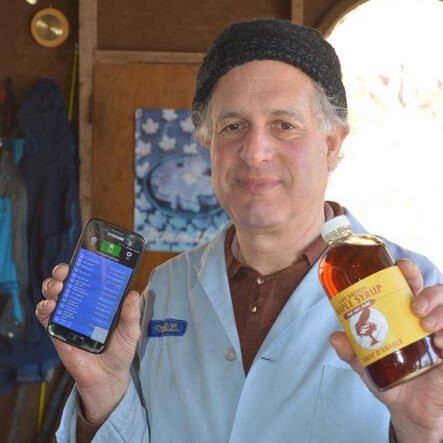By Andrew MacDonald
The Macdonald Notebook
September 22, 2021
TheMacdonaldNotebook.ca – Published March 23rd, 2024(The MacDonald Notebook is a weekend news online website, based in Halifax and Covering Business, Inside Politics and Cultural Affairs across Nova Scotia)
Neal Livingston reports it is a good season for his Black River Maple Syrup, doubling production over last year.
And, he will be supplying two Halifax food stores next week with his 2024 variety.
“I am between Mabou and Inverness near the distillery, so I say Mabou/Inverness area and my watercourse is part of the Margaree watershed,” Livingston tells The Notebook.
For my robust Metro Halifax readers, this year’s Black River product will be available at the health food store Organic Earth on Quinpool Road, with shipments arriving next week. As well, the Lebanese-inspired Mid-East food store on North Street retails the Mabou-made maple syrup and will get its fresh stock next week.

For my strong readership in the Antigonish-Port Hawkesbury area, you can buy the just-made 2024 version at the Sobeys store in Port Hawkesbury as well as all other Sobeys outlets on Cape Breton Island. On the Island, Co-Op stores are also retailing his brand.
If those locations do not work for you, Livingston will ship the product by courier. He uses Chester business titan Carl Potter’s delivery firm, MBW Courier, or Canada Post.
Touching base with Livingston this week, he is experiencing a good season at his Cape Breton maple bush operation.
“We have been working for a month because we were finishing a 40-year rebuild in our woods, replacing half the line. We replaced 23,000 feet and had already replaced about another 20,000 feet over the last decade.”
Livingston has also deployed a new monitoring technology, developed in Quebec, for detecting leaks in lines. “We are the 21st operation in the world to have this called ERABEC.”

A previous monitoring system installed ten years ago would tell within a hectare where the lines were leaking. “Now we can tell in about 100 feet,” with the new ERABEC technology,” Livingston tells The Notebook. “Ten years after I got Smartrek, I think only two or three other producers in NS have systems similar to Smarttrek, of about 85 commercial producers in NS.”
“I often do early tech adoption, its been a keynote to how I operate in business and personally.”
The upgrade work saw Livingston replace half the sugar bush’s lines, and the new electronic system monitors sensors placed on the lines in the woods, which uses an IT system.
“We tapped the trees three weeks ago. There was a weird flash-freeze which pushed the taps out a bit, so we had to go back and hammer 3,500 taps. But because we have this new monitoring system, we can actually see that was the problem, which was extraordinary because normally we would never have seen that.”
While he does not know how long the maple syrup production will last this season, “normally at this time of year, we are just starting to make maple syrup and (would) have 100 litres in the bottle. But by the end of the weekend, we will have 1,000 litres in the bottle.
“The way it looks to me, we are going to have a really good year and that is the result of spending a huge amount of money upgrading our forests.”
Livingston is a week earlier than normal in the woods.
“Last year, it was late and we had a third of the season, and this year we are getting really good maple weather.”
He has already doubled production over the last year.
“We’ve had half of the great year and two-thirds of a normal year.”
Livingston works the production with his son, who lives in Margaree half the year, and there are also a couple of folks he relies on in the woods part-time and one or two others in the syrup shack.
His maple syrup has a unique taste. “I continue to get letters from all over the world. “It’s our food practices and soil. It’s kind of like a vineyard in a winery, we are parallel to that.”
A week ago, while travelling to New York, Livingston ran into Premier Tim Houston who was attending a seafood conference, and the premier spotted Livingston at the business lounge at Newark Airport.
“A guy walked over to me while I was sitting and it was the Premier. I had a nice chat with him on a number of issues. I showed him the new ERABEC app for maple syrup and he really liked it.”
Livingston says Nova Scotia lacks regulations similar to those of Ontario and Quebec.
“You can cut down a hardwood forest here and you can’t do that in Quebec. You can put syrup in a bottle which is not yours and call it yours. That is not allowed in other places. We really have a lack of regulations here and that actually really stops new people getting into the industry and the industry growing, because if I can put five taps in my backyard, and buy a thousand gallons somewhere and put it into a bottle and say it is mine, that does not allow people to spend $250,000 to $500,000 setting up a maple syrup operation when we have a lack of regulations like that.”
Black River Syrup had less damage from Hurricane Fiona than from the ice storm a year before. “We were so lucky the centre of the hurricane went over us, which means you are less damaged. We lost 500 taps permanently from the ice storm and Fiona we probably just lost 25,” says Livingston.
“I have 3,600 taps, we were 4,000 before the ice storm reduced us to 3500, another small ice storm last year took us to 3,400, and now we are up to 3,600 taps,” says Livingston.

While there are many great maple producers in Nova Scotia, the thing that sets Livingston’s operation apart is that he boils his sap over a maple wood fire so his product has a definitive woody taste.
My mother, who grew up on a sustenance farm in Leitches Creek near North Sydney, says her father would make his own syrup, and did it the old-fashioned way with wood fuel. Livingston’s product brought back memories of the days when her parents also used maple wood to boil the sap in a farm.

There’s also a possible health advantage to using maple syrup instead of a daily spoonful of sugar in your coffee or on your porridge. “There’s some fascinating research going on with regard to something which is 66.7 percent sugar,” says Livingston. “And coffee is super good when it’s combined with maple syrup.”
An extensive study by the International Maple Syrup Institute found, “Health benefits of real maple syrup are far more comprehensive than you might expect. The only product in our diet coming directly from a plant’s sap, this natural sweetener features over 54 antioxidants that can help delay or prevent diseases caused by free radicals, such as cancer or diabetes. In addition, maple syrup features high levels of zinc and manganese, keeping the heart healthy and boosting the immune system.”
The study also highlights that maple syrup “delivers more overall nutritional value than many common sweeteners and has one of the lowest-calorie levels. Pure maple syrup provides enhanced antioxidant levels compared to other common and popular foods, such as apples and broccoli. Pure maple syrup may have other health benefits that are currently being studied.”
For his part, Livingston has been producing maple syrup in Mabou since 1985. The company’s label proudly proclaims it as ‘Cape Breton Maple Syrup‘, and retails for $35.99/litre, $21.99/500 ml, and $10.99/250 ml.
“It originated with a forestry management plan in 1980,” he says. “We couldn’t do traditional forestry on our property, so the forester suggested we use the maple trees on the property. So we did a test run in 1984 and opened the next year. We have the steepest maple syrup operation in North America, with slopes on our property that range from 45 to 75 degrees.”
With most of the 50 members of the Maple Producers Association of Nova Scotia located on the mainland, primarily in Cumberland and Colchester counties, with some representation from the Annapolis Valley and South Shore, the ‘terroir’ in Cape Breton, which has three maple syrup producers, produces syrup with a slightly different taste.

“People like our syrup because it is wood-fired and comes completely from our stand. It’s not blended with syrup from other producers,” Livingston says.
The sap for the syrup comes from 4,000 taps in his stand, fed through 15 kilometres of pipeline. He uses a reverse osmosis process coupled with quarter-inch spigots which are designed to do less harm to the tree than larger ones. The system he uses is energy efficient and takes 80 per cent of the water out of the sap so there is less boiling to produce the final product.
A few years ago, Livingston was at a crossroads in the business, trying to make the decision whether to ease out (he’s now 68) or invest in the property to make it more efficient and economical. He chose the second route and has invested in energy-efficient technology. He says he has a number of friends in the much larger Quebec maple syrup industry and keeps in touch with them on the latest and greatest industry trends.

“I was one of the first to install an electronic monitoring system on my lines,” he says. “It’s smart technology which tells you where lines break. This is our tenth year using it and it’s really helped us, especially with our steep terrain to enable us to tighten up the lines. We have 20,000 fittings in the operation and keeping on top of them and replacing them when needed is a real-time consumer. We also have a better handle on where the taps are leaking.
“As a result of this system, we are producing three times the amount of syrup we were ten years ago with the same number of taps.”
Mother Nature is his constant companion, living as he does in the snow belt that comes up along the Northumberland Strait, crosses the western side of Cape Breton and then heads to Newfoundland. As a result, starting the process is usually a little later than on the mainland.

In terms of maple syrup production, Nova Scotia is number four in Canada behind Quebec, Ontario, and New Brunswick and, according to the Maple Producers Association of Nova Scotia, this province produces one per cent of the national yield.
The association reports that 57,000 gallons were produced in 2017 by just under 200 producers, with a roughly $4 million gross value and slightly over-export value of just over $500,000. Livingston contributes roughly 1,000 to 1,500 litres of syrup to that effort.
Notebook Seal Of Approval
In the seven-year history of The Macdonald Notebook, its ‘Seal of Approval’ has only been granted three times to Nova Scotian food products, but that changed in 2020 when the seal was granted to Livingston’s Black River Maple Syrup.
Earlier approvals were awarded to Monte Snow’s fish emporium Fisherman’s Market for his smoked salmon, produced at his Bedford Highway retail and wholesale emporium; That Dutchman’s Cheese – Dragon’s Breath, served to visiting British Royals and made in Economy in Cumberland County; and the Haskapa juice company of Mahone Bay, which went out of business in 2019.
The Notebook is proud to bestow our rarely deployed Seal of Approval on what I think is Nova Scotia’s finest maple syrup, Black River Maple Syrup, produced by Neal Livingston at his operation in the wilds of Mabou, Cape Breton.
It has to be the best of the best.
—
Halifax, Nova Scotia
A Business, Political & Cultural Read
We publish on Saturdays, & Sundays


 Cart is empty
Cart is empty
